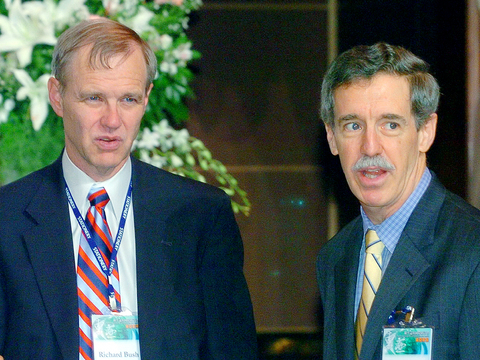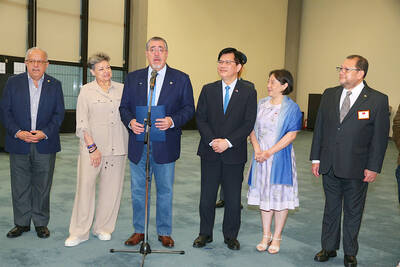The deputy director of the American Institute in Taiwan (AIT) encouraged Taiwan's political parties to move beyond partisanship to advance their common interests in cross-strait defense and stability, and reaffirmed that the governments on two sides of the Taiwan Strait should pursue dialogue without preconditions as soon as possible.
David Keegan made the remarks yesterday while delivering a speech at a forum on East Asia Security held by the Foundation on International and Cross-Strait Studies (
Keegan indicated that AIT is somewhat upbeat about the cross-strait relationship.

PHOTO: WANG MIN-WEI, TAIPEI TIMES
"We believed that trends are now moving in a generally positive direction, and we are cautiously optimistic that Beijing and Taipei will be able to further ease tensions and resume pragmatic contacts on economic and technical issues," Keegan said.
"It is important for Taipei and Beijing to continue to take actions that will build trust between the two sides and lay a foundation for a political-level dialogue further in the future," he said.
Despite China's passage of the "Anti-Secession" Law, Keegan said that it has raised international awareness of the cross-strait issue and put pressure on Beijing to show some measure of goodwill toward Taiwan.
The recent China visits by Chinese Nationalist Party (KMT) Chairman Lien Chan (連戰) and People First Party Chairman James Soong (宋楚瑜) are only the first steps toward opening the channels of communication across the Strait, Keegan said.
He stressed that "we call on Beijing to follow up on these contacts with a dialogue with the democratically elected leaders of Taiwan. Beijing and Taipei should pursue dialogue without precondition as soon as possible."
Keegan said Premier Frank Hsieh's (
"It seems that both sides are moving towards a compromise on priorities that would permit discussions on cargo and passenger charters flight simultaneously," he said.
Talking about the cross-strait military balance, Keegan said Taipei must maintain a defense that is an effective deterrent to reduce the chances of a cross-strait conflict.
"Taiwan cannot negotiate with China from a position of strength if Beijing calculates that it has the means to intimidate Taiwan at a time of its choosing," he said.
Since an agreement hasn't been reached on the country's defense budget, Keegan said that "the challenge for Taiwan's leaders is to move beyond partisanship to advocate common interests in cross-strait defense and stability."
Meanwhile, Mainland Affairs Council Chairman Joseph Wu (吳釗燮), while giving a speech earlier yesterday, said that the impasse in cross-strait dialogue is because of the preconditions set by the Chinese government.
Taking the issue of direct links as an example, Wu cited Beijing's preconditions that Taiwan agree to the "one China" principle and the "1992 consensus." China also considers cross-strait direct flights as "domestic affair."
"These preconditions are not acceptable to us and prove that China is not ready to negotiate with Taiwan," Wu said.
"Based on the experience of negotiating the issue of Lunar [New Year] charter flights early this year, the Chinese will remove all preconditions if they are ready to talk," Wu said.
"It's not that Taiwan is not willing to talk about political issues with China. The problem is that we can't accept China's preconditions," he said.
While some have speculated that Beijing would exert its political manners more flexibly with its emerging economic power, Wu, however, said that, "When the Chinese are dealing with the Taiwan issue, they are extremely hawkish."
Despite China's hawkish manner, Wu said that the nation's approach would be to continue to use a spirit of goodwill and conciliation, promising that Taiwan will pursue peace and negotiations with China.

Greenpeace yesterday said that it is to appeal a decision last month by the Taipei High Administrative Court to dismiss its 2021 lawsuit against the Ministry of Economic Affairs over “loose” regulations governing major corporate electricity consumers. The climate-related lawsuit — the first of its kind in Taiwan — sought to require the government to enforce higher green energy thresholds on major corporations to reduce emissions in light of climate change and an uptick in extreme weather. The suit, filed by Greenpeace East Asia, the Environmental Jurists Association and four individual plaintiffs, was dismissed on May 8 following four years of litigation. The

A former officer in China’s People’s Liberation Army (PLA) who witnessed the aftermath of the 1989 Tiananmen Square massacre has warned that Taiwan could face a similar fate if China attempts to unify the country by force. Li Xiaoming (李曉明), who was deployed to Beijing as a junior officer during the crackdown, said Taiwanese people should study the massacre carefully, because it offers a glimpse of what Beijing is willing to do to suppress dissent. “What happened in Tiananmen Square could happen in Taiwan too,” Li told CNA in a May 22 interview, ahead of the massacre’s 36th anniversary. “If Taiwanese students or

DIPLOMACY: It is Guatemalan President Bernardo Arevalo’s first visit to Taiwan since he took office last year, while Eswatini’s foreign minister is also paying a visit A delegation led by Guatemalan President Bernardo Arevalo arrived in Taiwan yesterday afternoon and is to visit President William Lai (賴清德) today. The delegation arrived at Taiwan Taoyuan International Airport at 4:55pm, and was greeted by Minister of Foreign Affairs Lin Chia-lung (林佳龍). It is Arevalo’s first trip to Taiwan since he took office last year, and following the visit, he is to travel to Japan to celebrate the 90th anniversary of diplomatic relations between the two countries. Arevalo said at the airport that he is very glad to make the visit to Taiwan, adding that he brings an important message of responsibility

STAY AWAY: An official said people should avoid disturbing snakes, as most do not actively attack humans, but would react defensively if threatened Taitung County authorities yesterday urged the public to stay vigilant and avoid disturbing snakes in the wild, following five reported snakebite cases in the county so far this year. Taitung County Fire Department secretary Lin Chien-cheng (林建誠) said two of the cases were in Donghe Township (東河) and involved the Taiwan habus, one person was bit by a Chinese pit viper near the South Link Railway and the remaining two were caused by unidentified snakes. He advised residents near fields to be cautious of snakes hiding in shady indoor areas, especially when entering or leaving their homes at night. In case of a